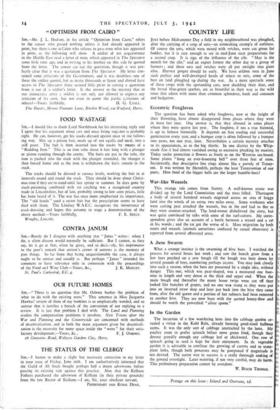COUNTRY LIFE
JusT before Midsummer Day a field in my neighbourhood was ploughed, after the carrying of a crop of oats—an astonishing example of earliness. Of course the oats, which were mixed with vetches, were cut green for fodder; but it is rare enough to see in mid-June such preparations for a second crop. It is sign of the influence of the silo. "May is the month for the silo," said an expert farmer the other day to a group of farmers ; and these oats and vetches were all put straight into giant silos. Harvest proper should be early. We have seldom seen in June such perfect and well-developed heads of wheat or oats, some of the best on land ploughed up during the war. As a mere spectacle some of these crops with the upstanding ears, now shedding their dust, and the broad blue-green spathes, are as beautiful in their way is the wild roses that adorn with more than common splendour, bank and common and hedgerow.
Eccentric Foxgloves
The question has been asked why foxgloves, now at the height of their flowering, have almost disappeared from places where they were in mass last' year. One answer is, that they abound in some places where they were sparse last year. The foxglove, if not a true biennial, is apt to behave biennially. It depends on free seeding and successful germination every year, and a bumper crop is often followed by a bumper two years, not one year, later. Nevertheless a certain mystery attaches to its appearances, as to the big thistle. In one district by the Whip- snade Zoo it had almost vanished owing to excessive plucking by tourists. Today under protection it flowers as freely as on the Western sea-board. Some plants "hang an ever-lessening bell" over three feet of stem. Incidentally, that descriptive line rings almost like a parody of Tenny- son. It was written by Meredith, perhaps the least Tennysonian of our poets. How fond of the bigger bells are the larger bumble-bees!
War-like Weasels
This strange tale comes from Surrey. A well-known estate was divided up by the Land Commission and the trees felled. Thereupon a body of Several hundred weasels migrated across an area of boggy land into the woods of an estate two miles away. Some workmen who were cutting peat attacked the weasels, but in the end had to flee as they were counter-attacked. The land-owner disbelieved the story, but was quite convinced by talks with some of the turf-cutters. My corre- spondent gives also an account of a battle between a weasel and a rat in his woods ; and the rat got the worse of it. Mass migration by both stoats and weasels (animals sometimes confused by casual observers) is reported from several afforested areas.
A June Swarm a What a strange instinct is the swarming of hive bees. I watched the E process for several hours last week ; and saw the bunch grow from a o few bees perched on a yew bough till the bough was bent down by t] several pounds of bees, numbering perhaps 20,000. You may look closely ( into such a swarm, when the bees are possessed by a single idea, without C danger. This one, which was pear-shaped, was a measured one foot- n nine in length and very dense at the thick and upper end. • When the b main bough and thereafter the many lesser twigs were cut off they b looked like bunches of grapes, and no one was stung as they were put it into an inverted straw skep and later put back into the hive they came from, after the old queen and a portion of her subjects had been removed u to another hive. They are now busy with the second honey-flow and should be worth the proverbial "silver spoon."
In the Garden
The incursion of a few wandering hens into the cabbage garden Iv- vealed a virtue in the Kohl Rabi, already forming good-sized bulbous stems. It was the only sort of cabbage unattacked by the hens. My poultry seem to prefer spinach before most green food, though they devour greedily enough any cabbage leaf or chickweed. One row of spinach going to seed is kept for their enjoyment. In tly. vegetable garden it is advisable to continue the growing of carrots and to trans- plant leeks, though both processes may be postponed if magnitude is not desired. The surest way to success is a really thorough soaking of the ground overnight. Later watering, if not very careful, may do harm. This preliminary preparation cannot be overdone.
W. BEACH THOMAS.
Postage on this issue : Inland and Overseas, id.


























 Previous page
Previous page